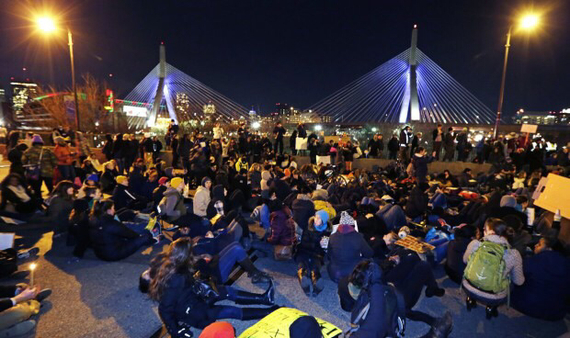Thursday night thousands of protesters blocked the streets of Boston, where I live, to express outrage at a New York grand jury's decision not to indict a police officer in the choking death of Eric Garner. After Michael Brown, Tamir Rice, and Eric Garner, it seems nearly impossible to deny that America, where young black males have a 21 times greater risk of being shot dead by police, has a real, systemic race problem. But denial seems to be working just fine on an institutional level. Take the Supreme Court's decision last year to Invalidate a key part of Voting Rights Act, wherein Chief Justice Robert suggested racism was no longer a real issue, insisting "our country has changed". Strange as it may seem, denying that systemic racism exists any longer in America and blaming its victims for entrenched inequality have proved enormously successful strategies in the systematic dismantling of everything from desegregation of schools and affirmative action to poverty measures and, of course, voting rights protections.
Thus the importance of mass protests. They are what the First Amendment was made for, and they keep it real. But do they really do anybody any good? They didn't stop the invasion of Iraq, even after the largest series of protests in human history saw millions raising their voices in the streets. More recently, the viral Occupy Movement was a hugely demoralizing failure of public protest across the globe, if we measure the impact in terms of real political change. And, let's face it, political change is the only measure that matters.
Racial segregation is a pervasive, everyday reality in America. Whether we're talking about the high-speed gentrification of our cities and the ongoing process of public housing ghettoization, the re-segregating of public schools, or a drug war that, with staggering efficiency, funnels young men of color into a private prison system -- a "cradle to prison pipeline" -- there's plenty of hard evidence that systemic racism is a fact of life in America today. But racism in America is generally portrayed in the popular media and perceived by even those on the business end of it as a social ill rooted in widespread personal prejudice or ignorance of white privilege, something individuals must inform themselves about and evolve out of, and in which public policy is, and must remain, neutral. It is, in other words, not perceived as a primarily political problem. Social change is vital, to be sure, but if the spontaneous protests of the Garner decision are an indication, social change has taken a step forward. It's political change that's taken two steps back.
Outrage feels like the only response at this point to many of us. But what comes after outrage? The failure of mass protest movements to manifest political change has not gone unnoticed. Some, like Zeynep Tufekci of the Center for Information Technology Policy at Princeton University, attribute it, paradoxically, to the ease of mass protest in the internet age. "Before the Internet, the tedious work of organizing that was required to circumvent censorship or to organize a protest also helped build infrastructure for decision making and strategies for sustaining momentum. Now movements can rush past that step, often to their own detriment." The spontaneity of protests in the Garner case demonstrate that the outrage is real -- and it is important to express that -- but outrage is cousin to despair, and protest movements can reinforce a sense of powerlessness if they fail to materialize into political campaigns.
The narrative of Ferguson, and the tragic deaths of Michael Brown, Tamir Rice, and Eric Garner, to name just three, must all be placed in the wider context of a government that is increasingly unresponsive to the will of the people. And while protests are one way to express that will, voting is another. Yet, as Ferguson smoldered, the 2014 midterms saw the lowest rate of voter turnout in 72 years, a miserable 36%. This worked in Republicans' favor big time, but incumbents in general, like St. Louis County, Missouri Prosecutor Robert P. McCulloch, who was reelected for the sixth straight time, benefited as well. Voter disaffection is a soft strategy that swings elections as surely as more overt strategies of voter suppression. The question the current wave of mass protests presents us with is: can we finally go from outrage to political action, or have we lost all hope in the democratic process? The irony here is obvious: if we give up on democracy, as these numbers suggest many have, what exactly is it we're fighting for?
